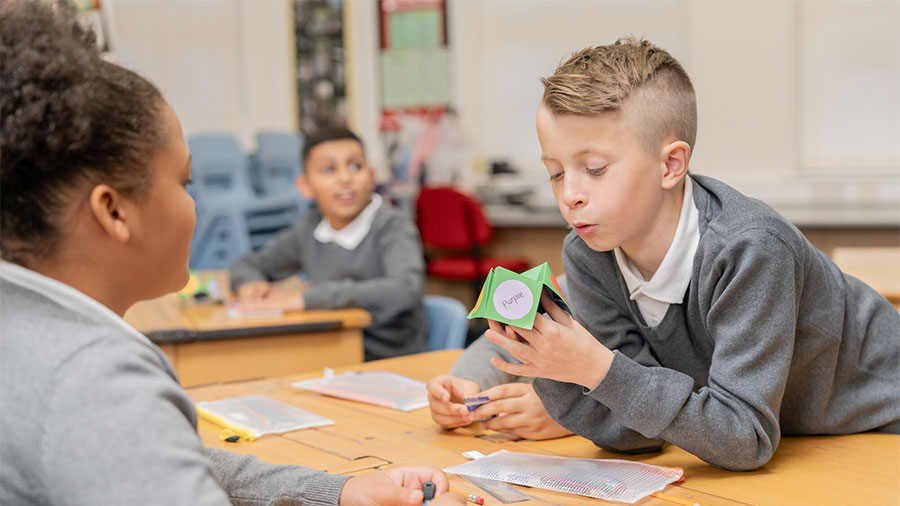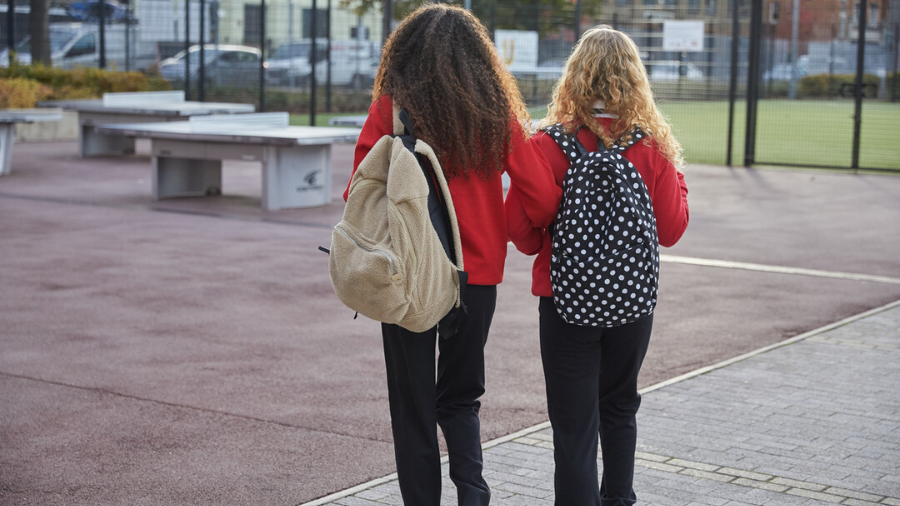Worried about a child?
Contact our helpline for free to talk to a trained professional - even if it's only to put your mind at ease.
Call us on 0808 800 5000, email help@nspcc.org.uk or fill in our online form.
Report Abuse in Education helpline
We’ve launched a dedicated helpline for children and young people who have experienced abuse at school, and for worried adults and professionals that need support and guidance, including for non-recent abuse. Call our new NSPCC helpine, Report Abuse in Education on 0800 136 663 or email help@nspcc.org.uk.
What does the law say about school?

To make sure every child has the support they need to learn, schools, parents and the local authority have different responsibilities – from finding a child a place at primary or secondary school to making sure they attend and learn everything they need to.
Learn more about your legal responsibilities at school:
- in England: Gov.UK
- in Northern Ireland: Education Authority
- in Scotland: Parentzone on education.gov.scot
- in Wales: Gov.Wales.
Children don't legally have to go to nursery. They can stay home with you or in childcare, but they must be in full-time education by the beginning of the first term after their 5th birthday.
Every child's different – and it might take time for them to be ready to be away from home. If you're concerned, you can talk to the school or their teacher. They might be able to provide some flexibility – building up to a normal school routine with half days – or have other ideas to help. We've got lots of advice about how to calm those first day nerves below.
Not every student wants to stay in school until they’re 18 – some want to leave earlier to find work, learn different skills and start being independent.
Depending on where you are in the United Kingdom, there are different laws about when a young person can leave school:
- In England, children can leave school on the last Friday in June if they’ll be 16 by the end of the summer holidays, however they must stay in some type of education or training until the end of the academic year that they turn 18. This includes a full-time education, an apprenticeship or traineeship, or working or volunteering for self-employed or volunteering for 20 hours or more a week whilst in part-time education or training.
- In Northern Ireland, if a child turns 16 during the school year (between 1 September and 1 July) they can leave school after 30 June. If they turn 16 between 2 July and 31 August, they can't leave school until 30 June the following year.
- In Scotland, if a child turns 16 between 1 March and 30 September, they can leave school after 31 May of that year. If they turn 16 between 1 October and the end of February, they can leave at the start of the Christmas holidays in that school year.
- In Wales, young people can leave school on the last Friday in June, as long as they’ll have turned 16 by the end of that school year’s summer holidays.
What rights do schools have?
Schools are responsible for keeping children safe at school, and for providing the best education they can. To help them do this, they have certain rights.
- Controlling access to school premises. Schools need to keep their students safe, so all school grounds are private and they control who is allowed in and when. Schools decide when parents or carers are allowed access – normally only at specific times. Schools can also bar parents from the premises.
- Schools can discipline students to ensure that every student is safe and is able to learn. This could include verbal warnings, missing break, written tasks, detention or fixed-term exclusions. Hitting or any other corporal punishment is illegal. Schools should consider a student’s age, special educational needs (also called additional support for learning or additional learning needs) or disability and their religious requirements to make sure the punishment is reasonable.
- Schools can use reasonable force in certain circumstances. This can include protecting a child from damaging themselves, property or someone else, or committing any offence. Learn more about schools’ rights to use reasonable force in England, Wales, Northern Ireland and Scotland.
- Schools in England and Wales can take measures to protect their students – including searching and screening pupils for dangerous or inappropriate items like drugs, alcohol, or weapons.
- Schools can exclude their students. Students can be permanently excluded – learn more about exclusions in England and Wales (Gov.UK), Northern Ireland (NiDirect), and Scotland (Citizens Advice Scotland).
You can read through your school’s written behaviour policy or code of conduct for more specific information on their rules and policies.
Find out more about the laws in England and Wales (Gov.UK), Northern Ireland (NiDirect) and Scotland (Citizens Advice Scotland).
Making a complaint
If you’re unhappy with how your child has been treated, the support they’ve received or any of the school’s policies, you have a right to complain. There are different ways of complaining depending on what type of school your child attends. More information is available about making complaints in England and Wales (Gov.UK), Scotland (Citizens Advice Scotland) and Northern Ireland (NiDirect). Call, email or submit an online form for expert advice from our Helpline.
Keeping children safe at school
It’s a good idea to keep talking to your child about school, even if nothing seems wrong. Ask them about their day – but try not to badger them. It’s important that if anything happens, they feel like they can talk to you about it.
As children grow up and start going to school, it’s also important to talk to them about their safety and what to look out for. It’s a tricky conversation to have – but we’ve got lots of resources to help.
- If your child is younger, use our friendly dinosaur Pantosaurus to help you Talk PANTS.
- If your child is older, we have advice about having tricky conversations.
Advice for parents
Going to nursery or primary school can be a scary time for young children. It’s normal for them to need some time to adjust to their new routine and environment.
To help them get used to their new school or nursery, you could try:
- getting into a good routine the week before, going to bed and waking up earlier
- talking through the school day with them, including playtimes and lunch time
- making sure your child knows who is collecting them and from where
- practice recognising their own name and the name of their teacher or teaching assistant
It’s common for children to feel nervous about going back to school after the holidays or the summer. To help calm their nerves and make sure they’re prepared for the school term you could try:
- readjusting bed times the week before they go back, to get into a healthy routine
- making sure they aren’t bringing their mobiles, tablets, or any devices to bed that might stop them sleeping
- helping them get the correct clothing or uniform and equipment ready the week before
- making sure they eat breakfast each morning
Nurseries, schools and colleges should all have systems in place to identify children with special education needs (SEN – also known as additional support for learning or additional learning needs) and to support them with their education and with taking part in activities. Parents and carers should also be informed, so they can work with teachers to help children and young people grow and learn.
A child or young person should never be excluded, isolated or discriminated against because of their special education needs or disability.
Call, email, or submit an online form to our Helpline if you would like more specific advice about supporting your child. Find out more about what you are entitled to in England and Wales (Gov.UK), Northern Ireland (Education Authority) and Scotland (Gov.Scot). ACE education has more resources and advice to help students with SEN.
As children grow up and change schools, or move to new schools in new areas, it may take some time for them to feel happy and comfortable. If you notice that your child has started behaving differently and you’re worried, it’s important you’re able to talk to your child’s teacher about it. They can help provide a full picture, and can help you support them with whatever they are struggling with.
Worried they’re being bullied?
Being bullied is a serious problem, and never your child’s fault. If you’re worried your child is being bullied, encourage them to talk to you about it, or if they don’t feel able to, to call Childline.
We have advice about how to spot the signs a child is being bullied, and what to do if they are. Childline also has advice for young people being bullied and message boards where they can find support.
Worried about their mental health?
If you have noticed a change in your child’s behaviour, they could be struggling with something at school, like bullying or harmful relationships, but they could also be struggling with their mental health. We have lots of advice about how to know if something is wrong and what you can do to help support them.
If your child has a hard time opening up to you, encourage them to get support from Childline’s counsellors. They also have information and advice for young people on mental health and coping with stress.
What age can a child come home from school alone?
 There’s no legal age that your child can travel home from school alone – this is up to you and your best judgement, or your school’s rules and policies. However, you should never leave a child alone who isn’t ready or is unable to care for themselves – learn more about leaving children home alone.
There’s no legal age that your child can travel home from school alone – this is up to you and your best judgement, or your school’s rules and policies. However, you should never leave a child alone who isn’t ready or is unable to care for themselves – learn more about leaving children home alone.
Every child is different – but some schools advise children under 8 shouldn't walk home without an adult or older sibling.
If you and your child do feel they’re ready to come home alone, it helps to go over some rules about staying safe.
- Make sure they know their address and your telephone number by heart, in case they get lost or have to navigate home from somewhere new.
- If they have a mobile phone, remind them to fully charge it before leaving the house, and make sure they have all your contact numbers saved.
- Talk to them about road safety. They should always look both ways before crossing the street, and never be on their phone whilst crossing a road.
- Remind them never to accept a lift from someone they don’t know, or let a stranger into the house. They should never give personal information away – in real life or online.
- Remind them that if they feel unsafe or uncomfortable at any time, they can call you or a trusted adult.
- If they ever feel like they’re in immediate danger, they should call the police straight away on 999.
Discrimination
Every student should be treated equally. If a child has been singled out, punished or excluded because of their race, sex, religion, sexual orientation, gender reassignment or pregnancy, this is discrimination under the Equality Act 2010. Call, email or submit an online form to our Helpline for advice about what steps to take.






